22 Oct 2017 | 05:02am IST
It is unfair to attend school and not learn
Some days ago the President of World Bank released the ‘Report on World Development, 2018’ under the title ‘Learning to Realise Education’s Promise,’ focusing on millions of children in poor countries who regularly attend school but learn little to nothing at all, particularly in India’s rural areas.
BY EUGENIO VIASSA MONTEIRO
Some days ago the President of World Bank released the ‘Report on World Development, 2018’ under the title ‘Learning to Realise Education’s Promise,’ focusing on millions of children in poor countries who regularly attend school but learn little to nothing at all, particularly in India’s rural areas.
If an effort is not made to generate base conditions – of enthusiasm, interest, additional tuition, questioning etc – children are doomed to not learn and not achieve any progress in their studies; later, they are condemned to low salaries and remain stuck in poverty that they do not deserve. It is utterly unfair on the poor! The President of the World Bank states: “this learning crisis is moral and economic;” education ends up being a lost opportunity to help them break out of the cycle of poverty.
It is not today’s problem. In 2009 James Tooley in his book ‘The Beautiful Tree: A Personal Journey into How the World's Poorest People are Educating Themselves’ drew attention to the fact that in many State schools, education standards were low – particularly in the older districts of Hyderabad - despite having decent premises and a teacher body on paid contract. Parents would rather send their children to private schools lacking official recognition, housed in narrow shabby buildings and where fees are paid. Private schools had a director, teachers were extremely dedicated and children were encouraged to be creative by organizing science and literature festivals, etc. Children were seen studying hard and carried enthusiasm into their homes to respective families.
When Tooley bluntly explained it to bureaucrats at the Ministry of Education they would not believe him. How was it possible for parents to opt for fee-paying education when they could send their children to cost-free State schools housed in proper buildings, equipped with gymnasiums and employing qualified teachers?
It was very hard to comprehend for powerful bureaucrats, who had never even set foot in the schools of their own jurisdiction. To them, Tooley must have been totally wrong.
At Tooley’s invitation they visited both public and private schools and heard from parents. This was an eye-opener to the prevailing reality. Teachers were recurrent absentees and behaved negligently at public schools. In a country as vast as India I am in no doubt that there has always been and there is a large pool of talented and responsible teachers. A word of praise is due to them!
But the need is felt to separate good professionals from the bad demand that the latter discharge their duties in full or be dismissed, while at the same time reward those who put in their best effort.
There is need to review labour laws to create more jobs and have many more entrepreneurs making investment decisions that will generate more wealth for the country. Perhaps a few ideas might help to radically improve the current state of affairs. These are directed at State governments in charge of primary and secondary education:
- On the one hand, provide aid to reference private schools helping them to improve their premises and ensuring that teachers are paid by the State. Without prejudice, education expenses should be State responsibility.
- On the other, a Director should be appointed – who may in turn pick his assistants – preferably a qualified teacher, also showing a managerial spirit, able to work on set targets and who can lead the school’s teacher body and support staff to work efficiently. He may promote collaboration from parents too.
Based on the set goals achieved, a system of bonuses should be set up. Teacher-linked educational success should feature prominently among the school’s set targets. Their performance should be evaluated by an independent body. The bonus system should include the Director, his assistants and all those who exceed their objectives. The Director’s nomination cannot be based on political affiliation. The smooth running and educational attainment of a school hinges on the Director. Just like in a major Corporation where the CEO is the organisation’s heartbeat ensuring its successful operation and growth.
